FIMA5020 - Dividend Policy Perspectives and BREXIT Implications for UK
VerifiedAdded on 2023/04/24
|13
|2989
|431
Report
AI Summary
This report provides an analysis of dividend policy from different theoretical perspectives, including the bird-in-the-hand theory, the irrelevance theory, and the tax benefit theory. It also examines the potential implications of BREXIT on the UK financial services industry, covering regulatory implications, economic consequences for the City, passporting issues, funding arrangements, and the applicability of EU directives. The report concludes with recommendations for navigating the challenges posed by BREXIT. Desklib offers a wide range of solved assignments and past papers for students.
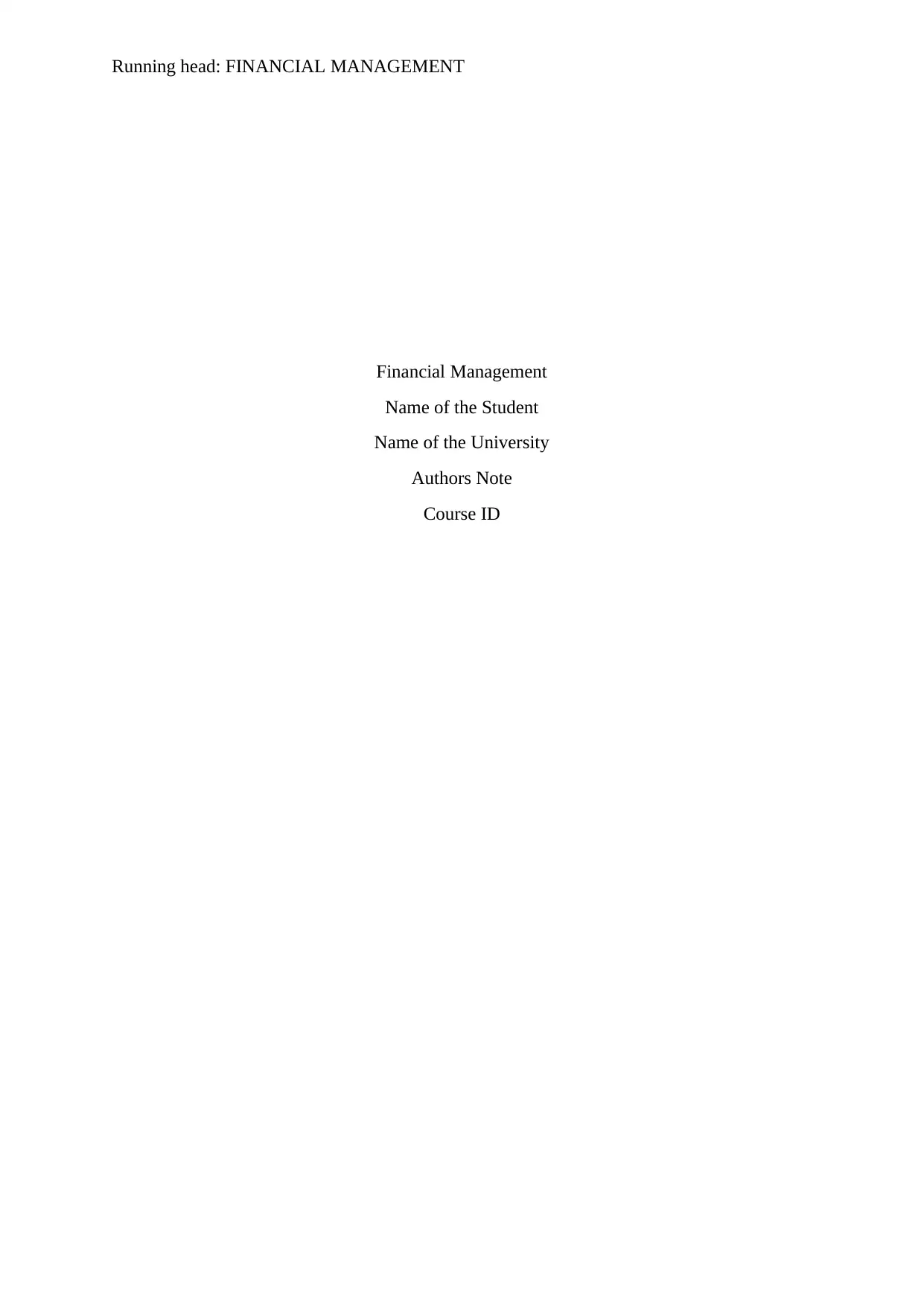
Running head: FINANCIAL MANAGEMENT
Financial Management
Name of the Student
Name of the University
Authors Note
Course ID
Financial Management
Name of the Student
Name of the University
Authors Note
Course ID
Paraphrase This Document
Need a fresh take? Get an instant paraphrase of this document with our AI Paraphraser
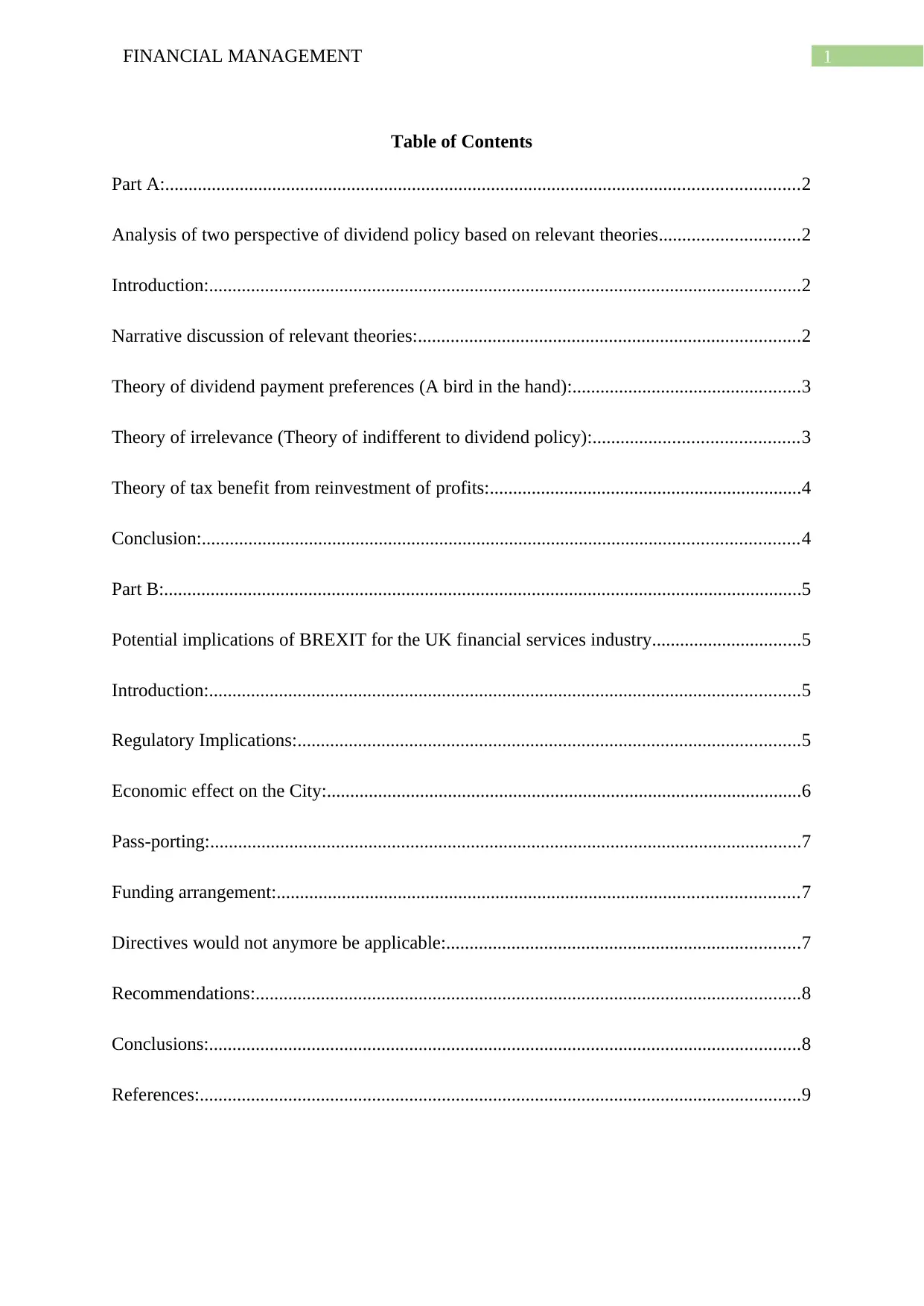
1FINANCIAL MANAGEMENT
Table of Contents
Part A:........................................................................................................................................2
Analysis of two perspective of dividend policy based on relevant theories..............................2
Introduction:...............................................................................................................................2
Narrative discussion of relevant theories:..................................................................................2
Theory of dividend payment preferences (A bird in the hand):.................................................3
Theory of irrelevance (Theory of indifferent to dividend policy):............................................3
Theory of tax benefit from reinvestment of profits:...................................................................4
Conclusion:................................................................................................................................4
Part B:.........................................................................................................................................5
Potential implications of BREXIT for the UK financial services industry................................5
Introduction:...............................................................................................................................5
Regulatory Implications:............................................................................................................5
Economic effect on the City:......................................................................................................6
Pass-porting:...............................................................................................................................7
Funding arrangement:................................................................................................................7
Directives would not anymore be applicable:............................................................................7
Recommendations:.....................................................................................................................8
Conclusions:...............................................................................................................................8
References:.................................................................................................................................9
Table of Contents
Part A:........................................................................................................................................2
Analysis of two perspective of dividend policy based on relevant theories..............................2
Introduction:...............................................................................................................................2
Narrative discussion of relevant theories:..................................................................................2
Theory of dividend payment preferences (A bird in the hand):.................................................3
Theory of irrelevance (Theory of indifferent to dividend policy):............................................3
Theory of tax benefit from reinvestment of profits:...................................................................4
Conclusion:................................................................................................................................4
Part B:.........................................................................................................................................5
Potential implications of BREXIT for the UK financial services industry................................5
Introduction:...............................................................................................................................5
Regulatory Implications:............................................................................................................5
Economic effect on the City:......................................................................................................6
Pass-porting:...............................................................................................................................7
Funding arrangement:................................................................................................................7
Directives would not anymore be applicable:............................................................................7
Recommendations:.....................................................................................................................8
Conclusions:...............................................................................................................................8
References:.................................................................................................................................9

2FINANCIAL MANAGEMENT
⊘ This is a preview!⊘
Do you want full access?
Subscribe today to unlock all pages.

Trusted by 1+ million students worldwide
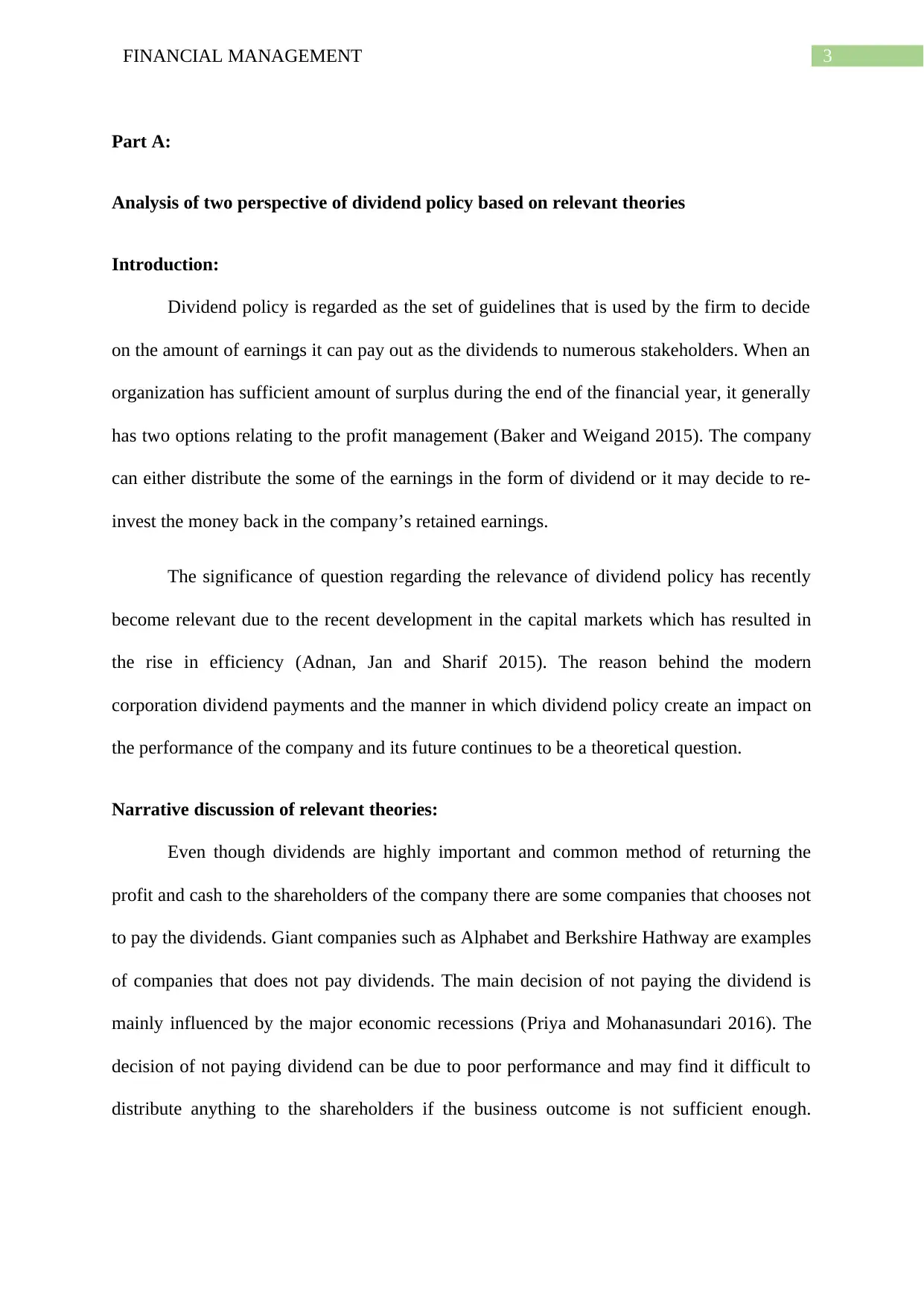
3FINANCIAL MANAGEMENT
Part A:
Analysis of two perspective of dividend policy based on relevant theories
Introduction:
Dividend policy is regarded as the set of guidelines that is used by the firm to decide
on the amount of earnings it can pay out as the dividends to numerous stakeholders. When an
organization has sufficient amount of surplus during the end of the financial year, it generally
has two options relating to the profit management (Baker and Weigand 2015). The company
can either distribute the some of the earnings in the form of dividend or it may decide to re-
invest the money back in the company’s retained earnings.
The significance of question regarding the relevance of dividend policy has recently
become relevant due to the recent development in the capital markets which has resulted in
the rise in efficiency (Adnan, Jan and Sharif 2015). The reason behind the modern
corporation dividend payments and the manner in which dividend policy create an impact on
the performance of the company and its future continues to be a theoretical question.
Narrative discussion of relevant theories:
Even though dividends are highly important and common method of returning the
profit and cash to the shareholders of the company there are some companies that chooses not
to pay the dividends. Giant companies such as Alphabet and Berkshire Hathway are examples
of companies that does not pay dividends. The main decision of not paying the dividend is
mainly influenced by the major economic recessions (Priya and Mohanasundari 2016). The
decision of not paying dividend can be due to poor performance and may find it difficult to
distribute anything to the shareholders if the business outcome is not sufficient enough.
Part A:
Analysis of two perspective of dividend policy based on relevant theories
Introduction:
Dividend policy is regarded as the set of guidelines that is used by the firm to decide
on the amount of earnings it can pay out as the dividends to numerous stakeholders. When an
organization has sufficient amount of surplus during the end of the financial year, it generally
has two options relating to the profit management (Baker and Weigand 2015). The company
can either distribute the some of the earnings in the form of dividend or it may decide to re-
invest the money back in the company’s retained earnings.
The significance of question regarding the relevance of dividend policy has recently
become relevant due to the recent development in the capital markets which has resulted in
the rise in efficiency (Adnan, Jan and Sharif 2015). The reason behind the modern
corporation dividend payments and the manner in which dividend policy create an impact on
the performance of the company and its future continues to be a theoretical question.
Narrative discussion of relevant theories:
Even though dividends are highly important and common method of returning the
profit and cash to the shareholders of the company there are some companies that chooses not
to pay the dividends. Giant companies such as Alphabet and Berkshire Hathway are examples
of companies that does not pay dividends. The main decision of not paying the dividend is
mainly influenced by the major economic recessions (Priya and Mohanasundari 2016). The
decision of not paying dividend can be due to poor performance and may find it difficult to
distribute anything to the shareholders if the business outcome is not sufficient enough.
Paraphrase This Document
Need a fresh take? Get an instant paraphrase of this document with our AI Paraphraser
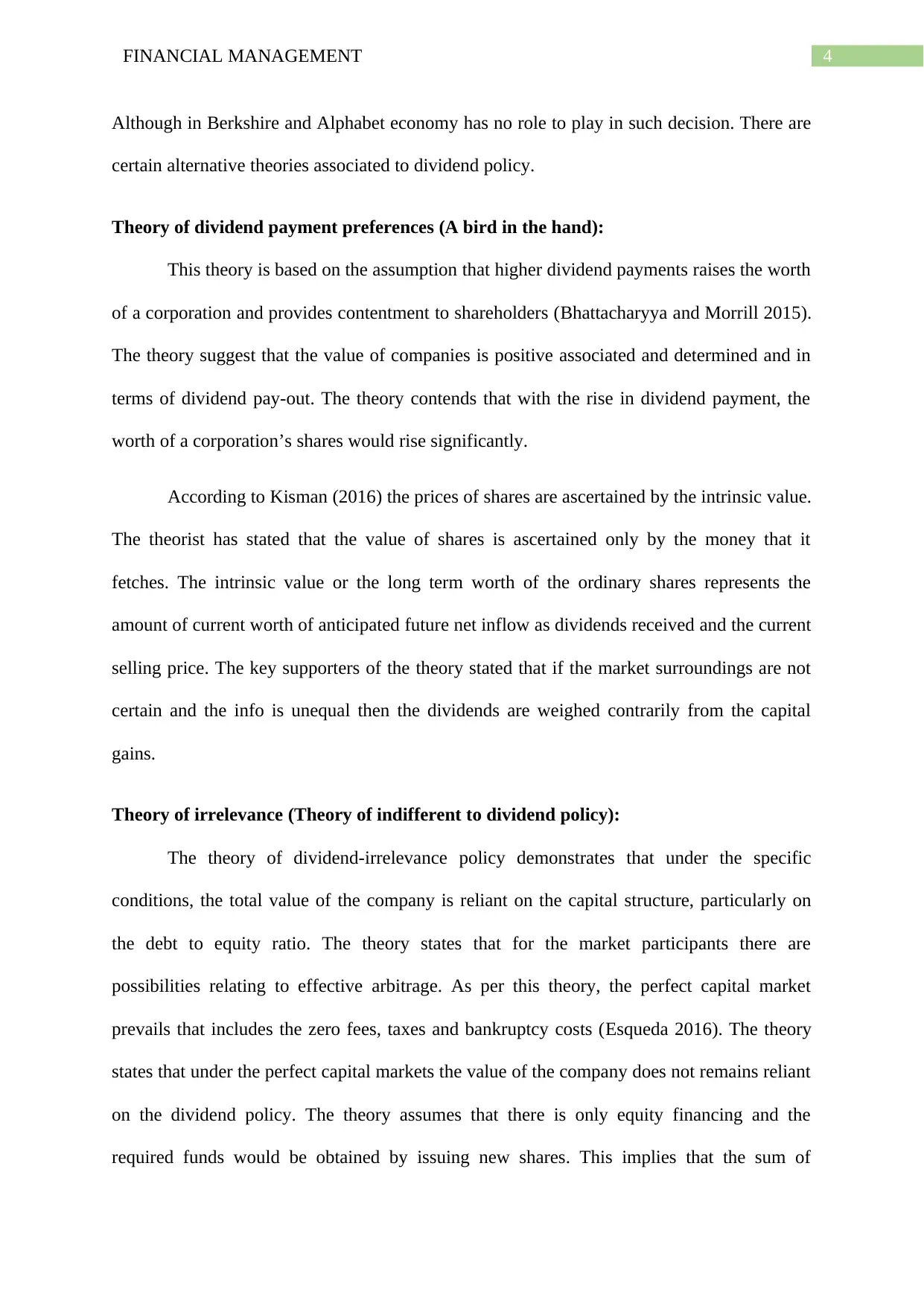
4FINANCIAL MANAGEMENT
Although in Berkshire and Alphabet economy has no role to play in such decision. There are
certain alternative theories associated to dividend policy.
Theory of dividend payment preferences (A bird in the hand):
This theory is based on the assumption that higher dividend payments raises the worth
of a corporation and provides contentment to shareholders (Bhattacharyya and Morrill 2015).
The theory suggest that the value of companies is positive associated and determined and in
terms of dividend pay-out. The theory contends that with the rise in dividend payment, the
worth of a corporation’s shares would rise significantly.
According to Kisman (2016) the prices of shares are ascertained by the intrinsic value.
The theorist has stated that the value of shares is ascertained only by the money that it
fetches. The intrinsic value or the long term worth of the ordinary shares represents the
amount of current worth of anticipated future net inflow as dividends received and the current
selling price. The key supporters of the theory stated that if the market surroundings are not
certain and the info is unequal then the dividends are weighed contrarily from the capital
gains.
Theory of irrelevance (Theory of indifferent to dividend policy):
The theory of dividend-irrelevance policy demonstrates that under the specific
conditions, the total value of the company is reliant on the capital structure, particularly on
the debt to equity ratio. The theory states that for the market participants there are
possibilities relating to effective arbitrage. As per this theory, the perfect capital market
prevails that includes the zero fees, taxes and bankruptcy costs (Esqueda 2016). The theory
states that under the perfect capital markets the value of the company does not remains reliant
on the dividend policy. The theory assumes that there is only equity financing and the
required funds would be obtained by issuing new shares. This implies that the sum of
Although in Berkshire and Alphabet economy has no role to play in such decision. There are
certain alternative theories associated to dividend policy.
Theory of dividend payment preferences (A bird in the hand):
This theory is based on the assumption that higher dividend payments raises the worth
of a corporation and provides contentment to shareholders (Bhattacharyya and Morrill 2015).
The theory suggest that the value of companies is positive associated and determined and in
terms of dividend pay-out. The theory contends that with the rise in dividend payment, the
worth of a corporation’s shares would rise significantly.
According to Kisman (2016) the prices of shares are ascertained by the intrinsic value.
The theorist has stated that the value of shares is ascertained only by the money that it
fetches. The intrinsic value or the long term worth of the ordinary shares represents the
amount of current worth of anticipated future net inflow as dividends received and the current
selling price. The key supporters of the theory stated that if the market surroundings are not
certain and the info is unequal then the dividends are weighed contrarily from the capital
gains.
Theory of irrelevance (Theory of indifferent to dividend policy):
The theory of dividend-irrelevance policy demonstrates that under the specific
conditions, the total value of the company is reliant on the capital structure, particularly on
the debt to equity ratio. The theory states that for the market participants there are
possibilities relating to effective arbitrage. As per this theory, the perfect capital market
prevails that includes the zero fees, taxes and bankruptcy costs (Esqueda 2016). The theory
states that under the perfect capital markets the value of the company does not remains reliant
on the dividend policy. The theory assumes that there is only equity financing and the
required funds would be obtained by issuing new shares. This implies that the sum of
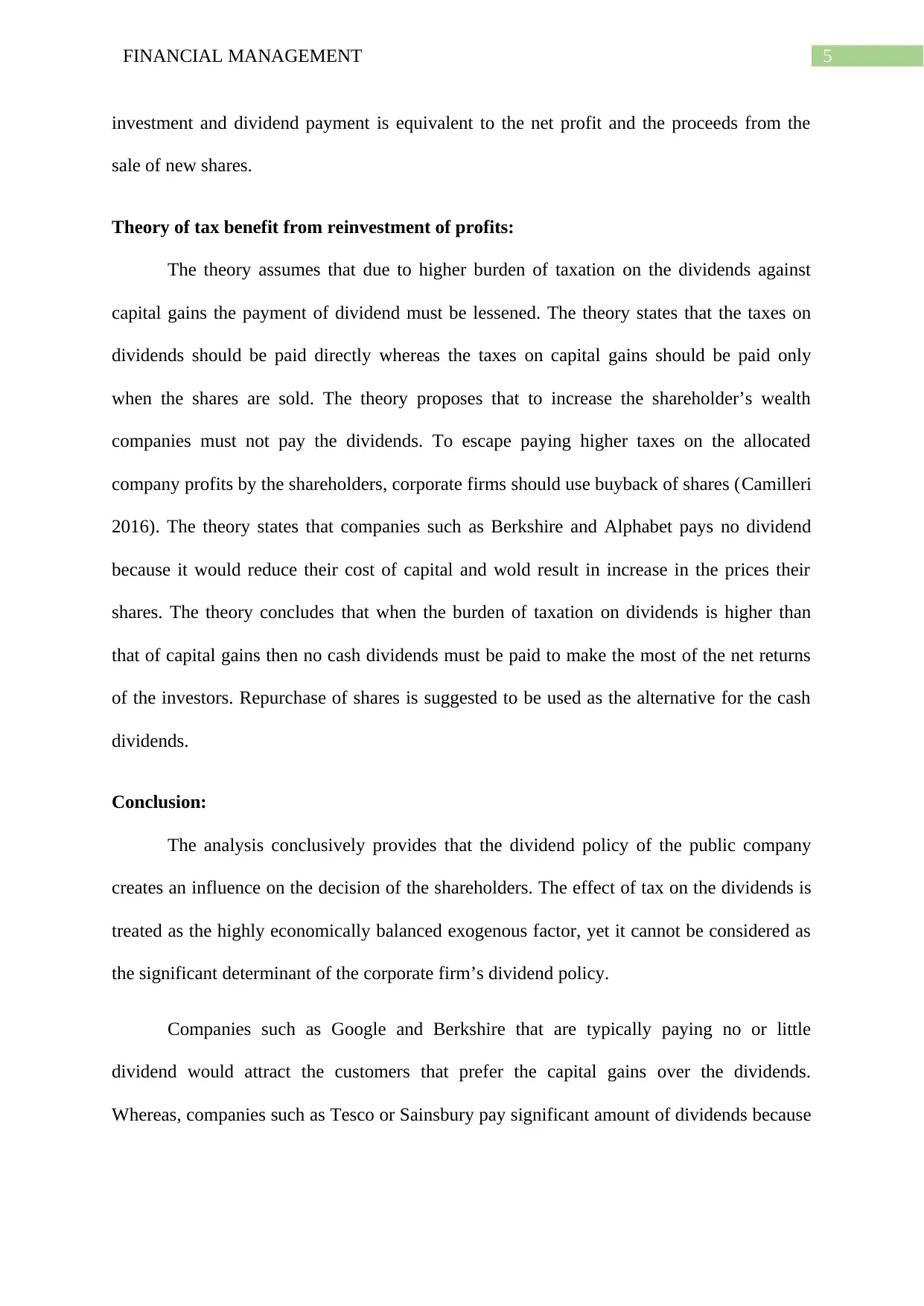
5FINANCIAL MANAGEMENT
investment and dividend payment is equivalent to the net profit and the proceeds from the
sale of new shares.
Theory of tax benefit from reinvestment of profits:
The theory assumes that due to higher burden of taxation on the dividends against
capital gains the payment of dividend must be lessened. The theory states that the taxes on
dividends should be paid directly whereas the taxes on capital gains should be paid only
when the shares are sold. The theory proposes that to increase the shareholder’s wealth
companies must not pay the dividends. To escape paying higher taxes on the allocated
company profits by the shareholders, corporate firms should use buyback of shares (Camilleri
2016). The theory states that companies such as Berkshire and Alphabet pays no dividend
because it would reduce their cost of capital and wold result in increase in the prices their
shares. The theory concludes that when the burden of taxation on dividends is higher than
that of capital gains then no cash dividends must be paid to make the most of the net returns
of the investors. Repurchase of shares is suggested to be used as the alternative for the cash
dividends.
Conclusion:
The analysis conclusively provides that the dividend policy of the public company
creates an influence on the decision of the shareholders. The effect of tax on the dividends is
treated as the highly economically balanced exogenous factor, yet it cannot be considered as
the significant determinant of the corporate firm’s dividend policy.
Companies such as Google and Berkshire that are typically paying no or little
dividend would attract the customers that prefer the capital gains over the dividends.
Whereas, companies such as Tesco or Sainsbury pay significant amount of dividends because
investment and dividend payment is equivalent to the net profit and the proceeds from the
sale of new shares.
Theory of tax benefit from reinvestment of profits:
The theory assumes that due to higher burden of taxation on the dividends against
capital gains the payment of dividend must be lessened. The theory states that the taxes on
dividends should be paid directly whereas the taxes on capital gains should be paid only
when the shares are sold. The theory proposes that to increase the shareholder’s wealth
companies must not pay the dividends. To escape paying higher taxes on the allocated
company profits by the shareholders, corporate firms should use buyback of shares (Camilleri
2016). The theory states that companies such as Berkshire and Alphabet pays no dividend
because it would reduce their cost of capital and wold result in increase in the prices their
shares. The theory concludes that when the burden of taxation on dividends is higher than
that of capital gains then no cash dividends must be paid to make the most of the net returns
of the investors. Repurchase of shares is suggested to be used as the alternative for the cash
dividends.
Conclusion:
The analysis conclusively provides that the dividend policy of the public company
creates an influence on the decision of the shareholders. The effect of tax on the dividends is
treated as the highly economically balanced exogenous factor, yet it cannot be considered as
the significant determinant of the corporate firm’s dividend policy.
Companies such as Google and Berkshire that are typically paying no or little
dividend would attract the customers that prefer the capital gains over the dividends.
Whereas, companies such as Tesco or Sainsbury pay significant amount of dividends because
⊘ This is a preview!⊘
Do you want full access?
Subscribe today to unlock all pages.

Trusted by 1+ million students worldwide
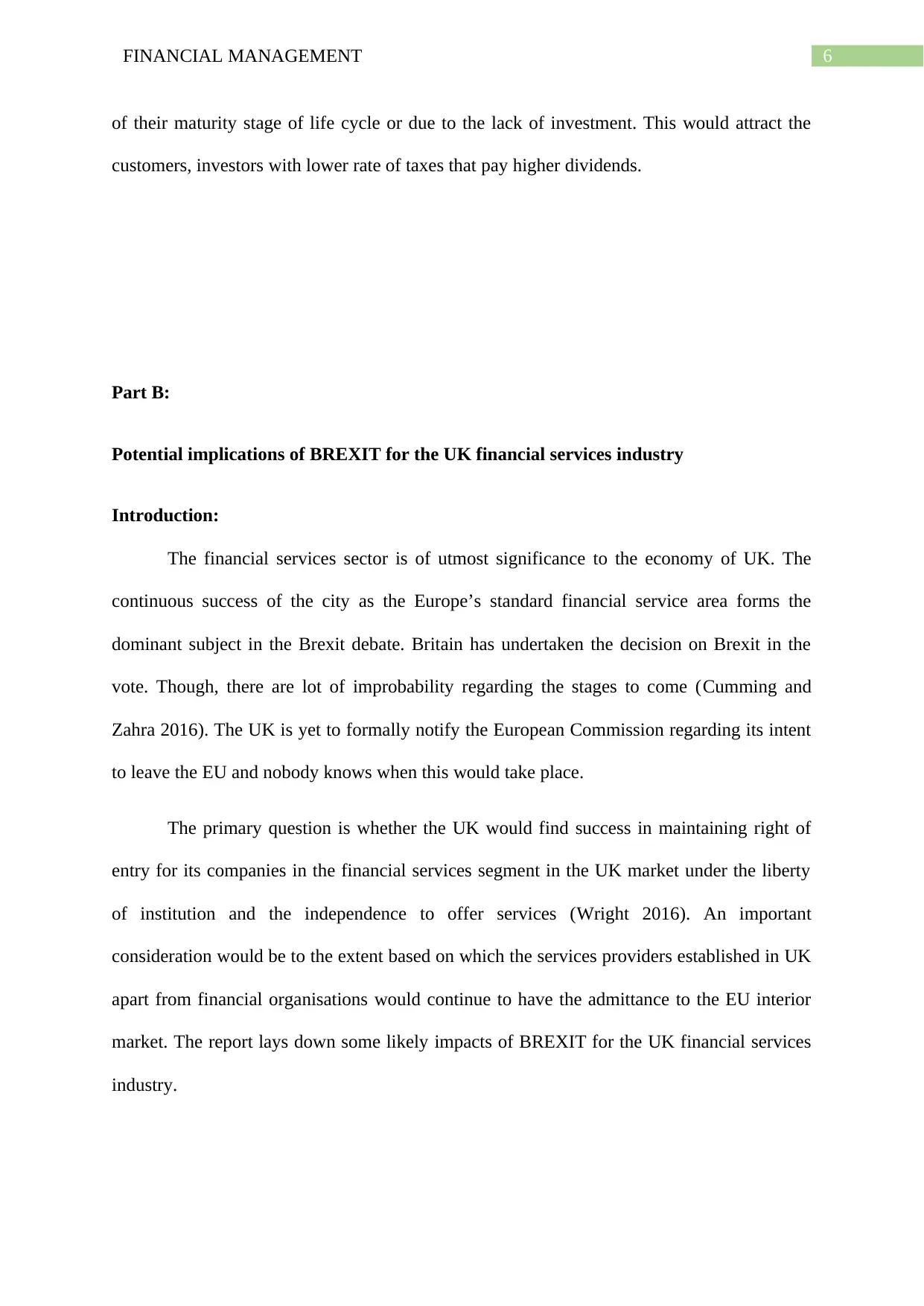
6FINANCIAL MANAGEMENT
of their maturity stage of life cycle or due to the lack of investment. This would attract the
customers, investors with lower rate of taxes that pay higher dividends.
Part B:
Potential implications of BREXIT for the UK financial services industry
Introduction:
The financial services sector is of utmost significance to the economy of UK. The
continuous success of the city as the Europe’s standard financial service area forms the
dominant subject in the Brexit debate. Britain has undertaken the decision on Brexit in the
vote. Though, there are lot of improbability regarding the stages to come (Cumming and
Zahra 2016). The UK is yet to formally notify the European Commission regarding its intent
to leave the EU and nobody knows when this would take place.
The primary question is whether the UK would find success in maintaining right of
entry for its companies in the financial services segment in the UK market under the liberty
of institution and the independence to offer services (Wright 2016). An important
consideration would be to the extent based on which the services providers established in UK
apart from financial organisations would continue to have the admittance to the EU interior
market. The report lays down some likely impacts of BREXIT for the UK financial services
industry.
of their maturity stage of life cycle or due to the lack of investment. This would attract the
customers, investors with lower rate of taxes that pay higher dividends.
Part B:
Potential implications of BREXIT for the UK financial services industry
Introduction:
The financial services sector is of utmost significance to the economy of UK. The
continuous success of the city as the Europe’s standard financial service area forms the
dominant subject in the Brexit debate. Britain has undertaken the decision on Brexit in the
vote. Though, there are lot of improbability regarding the stages to come (Cumming and
Zahra 2016). The UK is yet to formally notify the European Commission regarding its intent
to leave the EU and nobody knows when this would take place.
The primary question is whether the UK would find success in maintaining right of
entry for its companies in the financial services segment in the UK market under the liberty
of institution and the independence to offer services (Wright 2016). An important
consideration would be to the extent based on which the services providers established in UK
apart from financial organisations would continue to have the admittance to the EU interior
market. The report lays down some likely impacts of BREXIT for the UK financial services
industry.
Paraphrase This Document
Need a fresh take? Get an instant paraphrase of this document with our AI Paraphraser
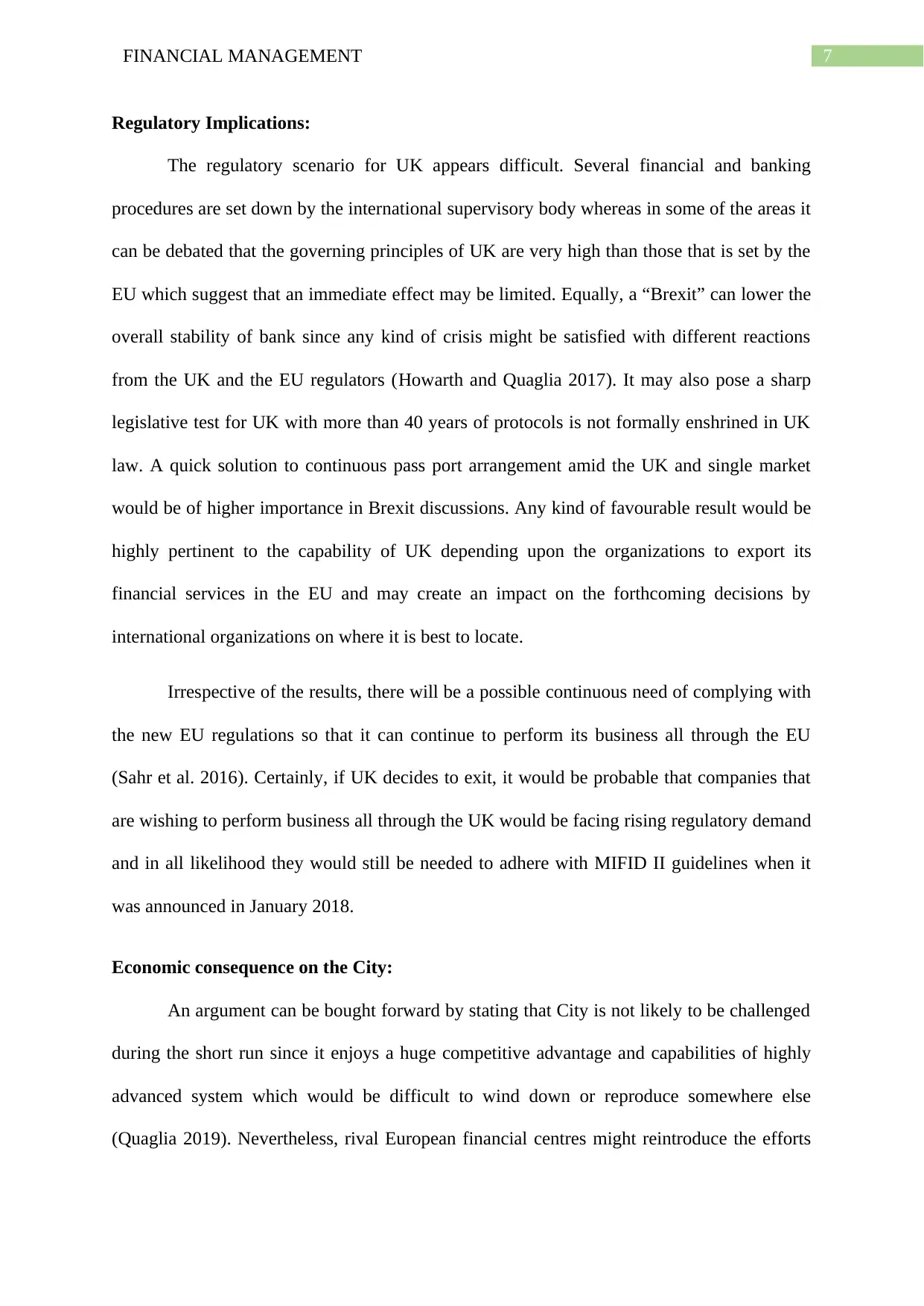
7FINANCIAL MANAGEMENT
Regulatory Implications:
The regulatory scenario for UK appears difficult. Several financial and banking
procedures are set down by the international supervisory body whereas in some of the areas it
can be debated that the governing principles of UK are very high than those that is set by the
EU which suggest that an immediate effect may be limited. Equally, a “Brexit” can lower the
overall stability of bank since any kind of crisis might be satisfied with different reactions
from the UK and the EU regulators (Howarth and Quaglia 2017). It may also pose a sharp
legislative test for UK with more than 40 years of protocols is not formally enshrined in UK
law. A quick solution to continuous pass port arrangement amid the UK and single market
would be of higher importance in Brexit discussions. Any kind of favourable result would be
highly pertinent to the capability of UK depending upon the organizations to export its
financial services in the EU and may create an impact on the forthcoming decisions by
international organizations on where it is best to locate.
Irrespective of the results, there will be a possible continuous need of complying with
the new EU regulations so that it can continue to perform its business all through the EU
(Sahr et al. 2016). Certainly, if UK decides to exit, it would be probable that companies that
are wishing to perform business all through the UK would be facing rising regulatory demand
and in all likelihood they would still be needed to adhere with MIFID II guidelines when it
was announced in January 2018.
Economic consequence on the City:
An argument can be bought forward by stating that City is not likely to be challenged
during the short run since it enjoys a huge competitive advantage and capabilities of highly
advanced system which would be difficult to wind down or reproduce somewhere else
(Quaglia 2019). Nevertheless, rival European financial centres might reintroduce the efforts
Regulatory Implications:
The regulatory scenario for UK appears difficult. Several financial and banking
procedures are set down by the international supervisory body whereas in some of the areas it
can be debated that the governing principles of UK are very high than those that is set by the
EU which suggest that an immediate effect may be limited. Equally, a “Brexit” can lower the
overall stability of bank since any kind of crisis might be satisfied with different reactions
from the UK and the EU regulators (Howarth and Quaglia 2017). It may also pose a sharp
legislative test for UK with more than 40 years of protocols is not formally enshrined in UK
law. A quick solution to continuous pass port arrangement amid the UK and single market
would be of higher importance in Brexit discussions. Any kind of favourable result would be
highly pertinent to the capability of UK depending upon the organizations to export its
financial services in the EU and may create an impact on the forthcoming decisions by
international organizations on where it is best to locate.
Irrespective of the results, there will be a possible continuous need of complying with
the new EU regulations so that it can continue to perform its business all through the EU
(Sahr et al. 2016). Certainly, if UK decides to exit, it would be probable that companies that
are wishing to perform business all through the UK would be facing rising regulatory demand
and in all likelihood they would still be needed to adhere with MIFID II guidelines when it
was announced in January 2018.
Economic consequence on the City:
An argument can be bought forward by stating that City is not likely to be challenged
during the short run since it enjoys a huge competitive advantage and capabilities of highly
advanced system which would be difficult to wind down or reproduce somewhere else
(Quaglia 2019). Nevertheless, rival European financial centres might reintroduce the efforts
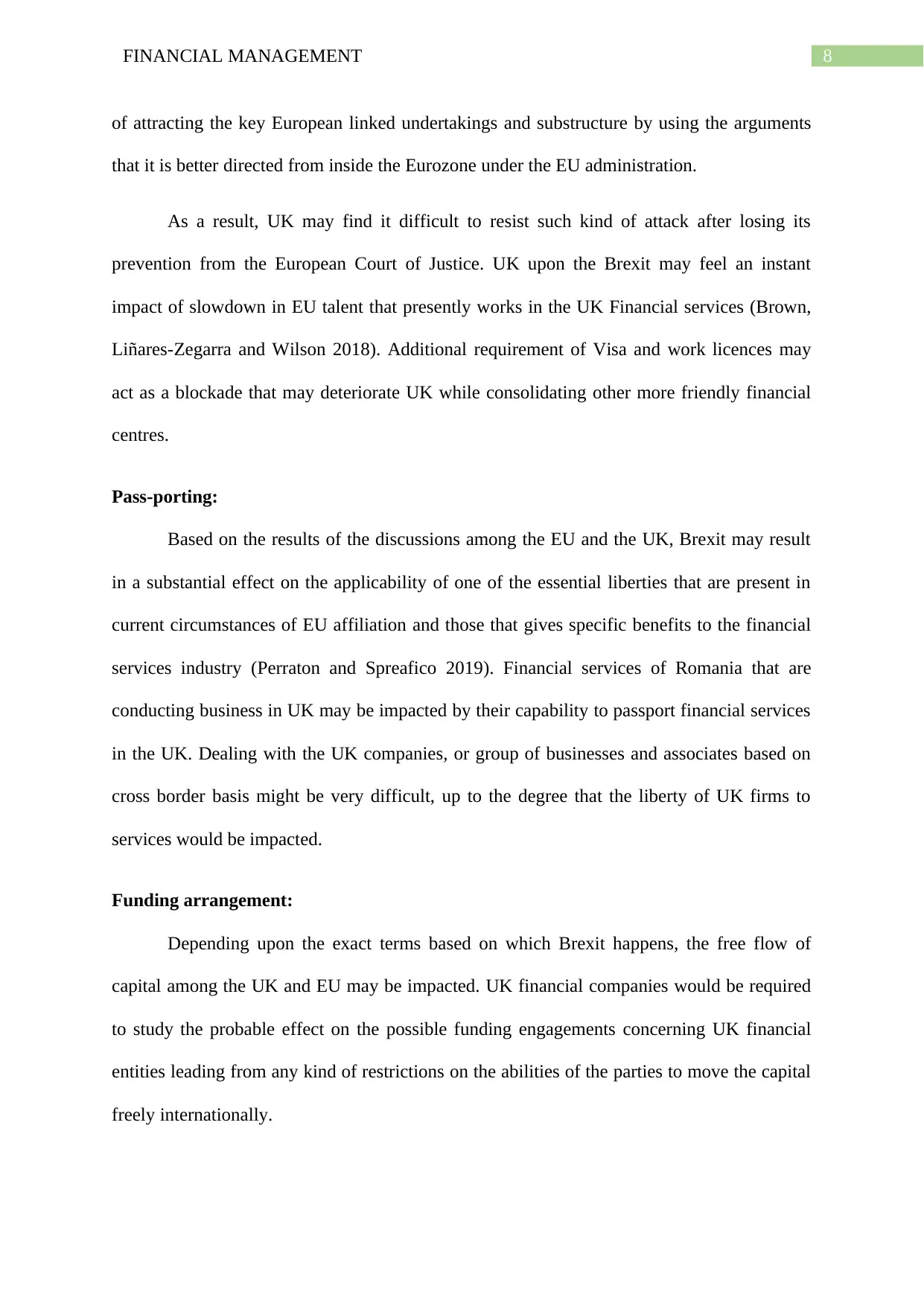
8FINANCIAL MANAGEMENT
of attracting the key European linked undertakings and substructure by using the arguments
that it is better directed from inside the Eurozone under the EU administration.
As a result, UK may find it difficult to resist such kind of attack after losing its
prevention from the European Court of Justice. UK upon the Brexit may feel an instant
impact of slowdown in EU talent that presently works in the UK Financial services (Brown,
Liñares-Zegarra and Wilson 2018). Additional requirement of Visa and work licences may
act as a blockade that may deteriorate UK while consolidating other more friendly financial
centres.
Pass-porting:
Based on the results of the discussions among the EU and the UK, Brexit may result
in a substantial effect on the applicability of one of the essential liberties that are present in
current circumstances of EU affiliation and those that gives specific benefits to the financial
services industry (Perraton and Spreafico 2019). Financial services of Romania that are
conducting business in UK may be impacted by their capability to passport financial services
in the UK. Dealing with the UK companies, or group of businesses and associates based on
cross border basis might be very difficult, up to the degree that the liberty of UK firms to
services would be impacted.
Funding arrangement:
Depending upon the exact terms based on which Brexit happens, the free flow of
capital among the UK and EU may be impacted. UK financial companies would be required
to study the probable effect on the possible funding engagements concerning UK financial
entities leading from any kind of restrictions on the abilities of the parties to move the capital
freely internationally.
of attracting the key European linked undertakings and substructure by using the arguments
that it is better directed from inside the Eurozone under the EU administration.
As a result, UK may find it difficult to resist such kind of attack after losing its
prevention from the European Court of Justice. UK upon the Brexit may feel an instant
impact of slowdown in EU talent that presently works in the UK Financial services (Brown,
Liñares-Zegarra and Wilson 2018). Additional requirement of Visa and work licences may
act as a blockade that may deteriorate UK while consolidating other more friendly financial
centres.
Pass-porting:
Based on the results of the discussions among the EU and the UK, Brexit may result
in a substantial effect on the applicability of one of the essential liberties that are present in
current circumstances of EU affiliation and those that gives specific benefits to the financial
services industry (Perraton and Spreafico 2019). Financial services of Romania that are
conducting business in UK may be impacted by their capability to passport financial services
in the UK. Dealing with the UK companies, or group of businesses and associates based on
cross border basis might be very difficult, up to the degree that the liberty of UK firms to
services would be impacted.
Funding arrangement:
Depending upon the exact terms based on which Brexit happens, the free flow of
capital among the UK and EU may be impacted. UK financial companies would be required
to study the probable effect on the possible funding engagements concerning UK financial
entities leading from any kind of restrictions on the abilities of the parties to move the capital
freely internationally.
⊘ This is a preview!⊘
Do you want full access?
Subscribe today to unlock all pages.

Trusted by 1+ million students worldwide
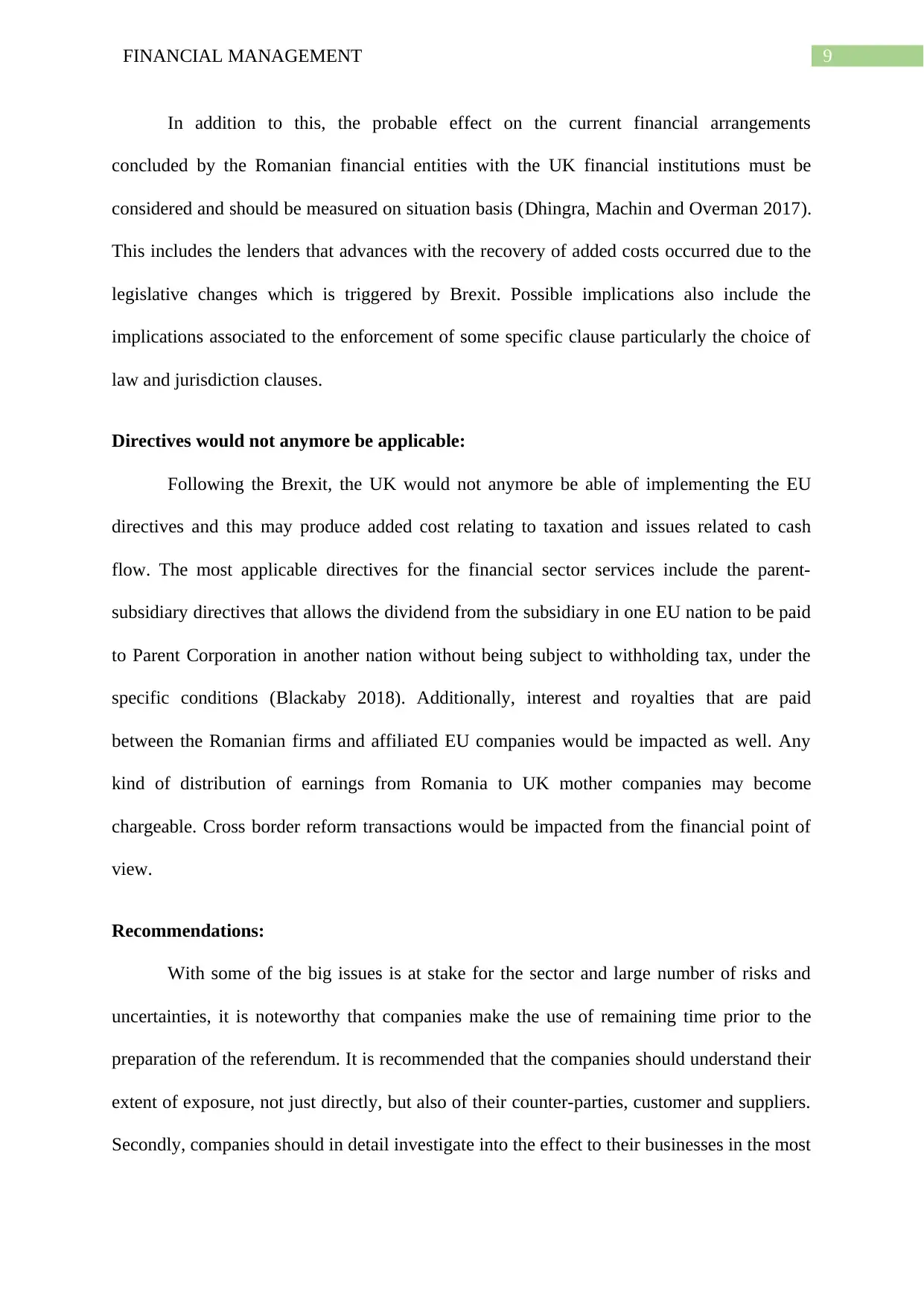
9FINANCIAL MANAGEMENT
In addition to this, the probable effect on the current financial arrangements
concluded by the Romanian financial entities with the UK financial institutions must be
considered and should be measured on situation basis (Dhingra, Machin and Overman 2017).
This includes the lenders that advances with the recovery of added costs occurred due to the
legislative changes which is triggered by Brexit. Possible implications also include the
implications associated to the enforcement of some specific clause particularly the choice of
law and jurisdiction clauses.
Directives would not anymore be applicable:
Following the Brexit, the UK would not anymore be able of implementing the EU
directives and this may produce added cost relating to taxation and issues related to cash
flow. The most applicable directives for the financial sector services include the parent-
subsidiary directives that allows the dividend from the subsidiary in one EU nation to be paid
to Parent Corporation in another nation without being subject to withholding tax, under the
specific conditions (Blackaby 2018). Additionally, interest and royalties that are paid
between the Romanian firms and affiliated EU companies would be impacted as well. Any
kind of distribution of earnings from Romania to UK mother companies may become
chargeable. Cross border reform transactions would be impacted from the financial point of
view.
Recommendations:
With some of the big issues is at stake for the sector and large number of risks and
uncertainties, it is noteworthy that companies make the use of remaining time prior to the
preparation of the referendum. It is recommended that the companies should understand their
extent of exposure, not just directly, but also of their counter-parties, customer and suppliers.
Secondly, companies should in detail investigate into the effect to their businesses in the most
In addition to this, the probable effect on the current financial arrangements
concluded by the Romanian financial entities with the UK financial institutions must be
considered and should be measured on situation basis (Dhingra, Machin and Overman 2017).
This includes the lenders that advances with the recovery of added costs occurred due to the
legislative changes which is triggered by Brexit. Possible implications also include the
implications associated to the enforcement of some specific clause particularly the choice of
law and jurisdiction clauses.
Directives would not anymore be applicable:
Following the Brexit, the UK would not anymore be able of implementing the EU
directives and this may produce added cost relating to taxation and issues related to cash
flow. The most applicable directives for the financial sector services include the parent-
subsidiary directives that allows the dividend from the subsidiary in one EU nation to be paid
to Parent Corporation in another nation without being subject to withholding tax, under the
specific conditions (Blackaby 2018). Additionally, interest and royalties that are paid
between the Romanian firms and affiliated EU companies would be impacted as well. Any
kind of distribution of earnings from Romania to UK mother companies may become
chargeable. Cross border reform transactions would be impacted from the financial point of
view.
Recommendations:
With some of the big issues is at stake for the sector and large number of risks and
uncertainties, it is noteworthy that companies make the use of remaining time prior to the
preparation of the referendum. It is recommended that the companies should understand their
extent of exposure, not just directly, but also of their counter-parties, customer and suppliers.
Secondly, companies should in detail investigate into the effect to their businesses in the most
Paraphrase This Document
Need a fresh take? Get an instant paraphrase of this document with our AI Paraphraser
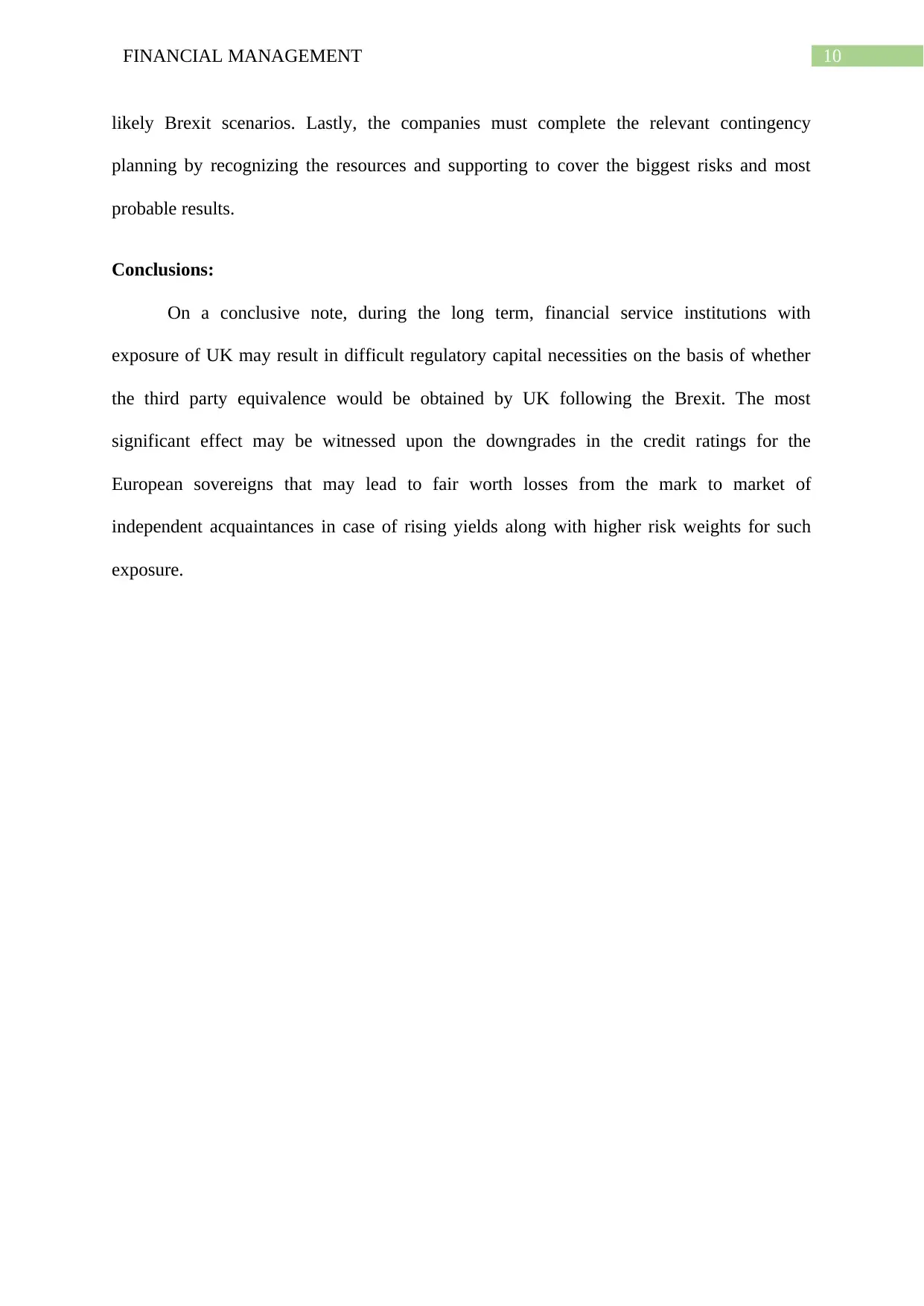
10FINANCIAL MANAGEMENT
likely Brexit scenarios. Lastly, the companies must complete the relevant contingency
planning by recognizing the resources and supporting to cover the biggest risks and most
probable results.
Conclusions:
On a conclusive note, during the long term, financial service institutions with
exposure of UK may result in difficult regulatory capital necessities on the basis of whether
the third party equivalence would be obtained by UK following the Brexit. The most
significant effect may be witnessed upon the downgrades in the credit ratings for the
European sovereigns that may lead to fair worth losses from the mark to market of
independent acquaintances in case of rising yields along with higher risk weights for such
exposure.
likely Brexit scenarios. Lastly, the companies must complete the relevant contingency
planning by recognizing the resources and supporting to cover the biggest risks and most
probable results.
Conclusions:
On a conclusive note, during the long term, financial service institutions with
exposure of UK may result in difficult regulatory capital necessities on the basis of whether
the third party equivalence would be obtained by UK following the Brexit. The most
significant effect may be witnessed upon the downgrades in the credit ratings for the
European sovereigns that may lead to fair worth losses from the mark to market of
independent acquaintances in case of rising yields along with higher risk weights for such
exposure.
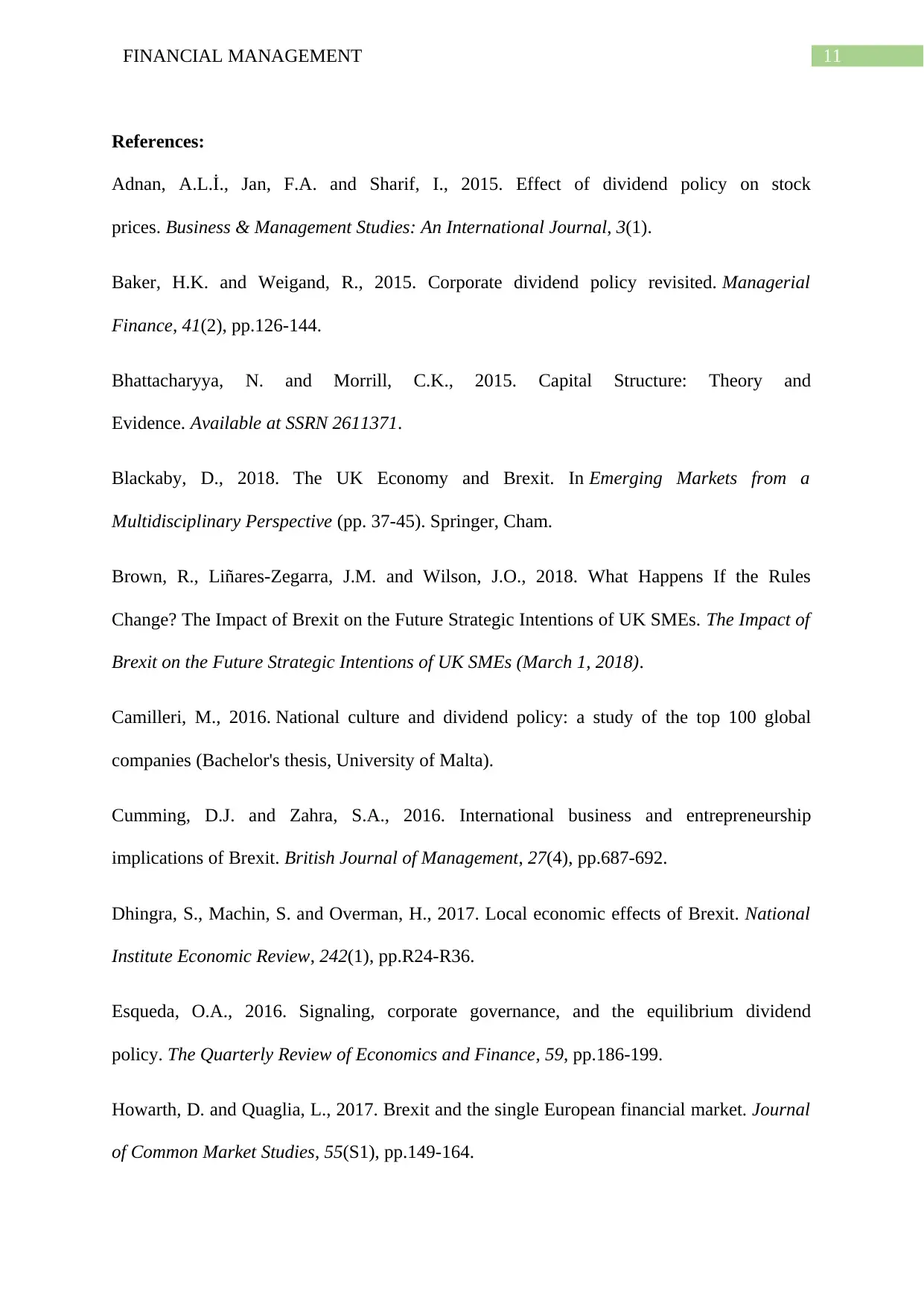
11FINANCIAL MANAGEMENT
References:
Adnan, A.L.İ., Jan, F.A. and Sharif, I., 2015. Effect of dividend policy on stock
prices. Business & Management Studies: An International Journal, 3(1).
Baker, H.K. and Weigand, R., 2015. Corporate dividend policy revisited. Managerial
Finance, 41(2), pp.126-144.
Bhattacharyya, N. and Morrill, C.K., 2015. Capital Structure: Theory and
Evidence. Available at SSRN 2611371.
Blackaby, D., 2018. The UK Economy and Brexit. In Emerging Markets from a
Multidisciplinary Perspective (pp. 37-45). Springer, Cham.
Brown, R., Liñares-Zegarra, J.M. and Wilson, J.O., 2018. What Happens If the Rules
Change? The Impact of Brexit on the Future Strategic Intentions of UK SMEs. The Impact of
Brexit on the Future Strategic Intentions of UK SMEs (March 1, 2018).
Camilleri, M., 2016. National culture and dividend policy: a study of the top 100 global
companies (Bachelor's thesis, University of Malta).
Cumming, D.J. and Zahra, S.A., 2016. International business and entrepreneurship
implications of Brexit. British Journal of Management, 27(4), pp.687-692.
Dhingra, S., Machin, S. and Overman, H., 2017. Local economic effects of Brexit. National
Institute Economic Review, 242(1), pp.R24-R36.
Esqueda, O.A., 2016. Signaling, corporate governance, and the equilibrium dividend
policy. The Quarterly Review of Economics and Finance, 59, pp.186-199.
Howarth, D. and Quaglia, L., 2017. Brexit and the single European financial market. Journal
of Common Market Studies, 55(S1), pp.149-164.
References:
Adnan, A.L.İ., Jan, F.A. and Sharif, I., 2015. Effect of dividend policy on stock
prices. Business & Management Studies: An International Journal, 3(1).
Baker, H.K. and Weigand, R., 2015. Corporate dividend policy revisited. Managerial
Finance, 41(2), pp.126-144.
Bhattacharyya, N. and Morrill, C.K., 2015. Capital Structure: Theory and
Evidence. Available at SSRN 2611371.
Blackaby, D., 2018. The UK Economy and Brexit. In Emerging Markets from a
Multidisciplinary Perspective (pp. 37-45). Springer, Cham.
Brown, R., Liñares-Zegarra, J.M. and Wilson, J.O., 2018. What Happens If the Rules
Change? The Impact of Brexit on the Future Strategic Intentions of UK SMEs. The Impact of
Brexit on the Future Strategic Intentions of UK SMEs (March 1, 2018).
Camilleri, M., 2016. National culture and dividend policy: a study of the top 100 global
companies (Bachelor's thesis, University of Malta).
Cumming, D.J. and Zahra, S.A., 2016. International business and entrepreneurship
implications of Brexit. British Journal of Management, 27(4), pp.687-692.
Dhingra, S., Machin, S. and Overman, H., 2017. Local economic effects of Brexit. National
Institute Economic Review, 242(1), pp.R24-R36.
Esqueda, O.A., 2016. Signaling, corporate governance, and the equilibrium dividend
policy. The Quarterly Review of Economics and Finance, 59, pp.186-199.
Howarth, D. and Quaglia, L., 2017. Brexit and the single European financial market. Journal
of Common Market Studies, 55(S1), pp.149-164.
⊘ This is a preview!⊘
Do you want full access?
Subscribe today to unlock all pages.

Trusted by 1+ million students worldwide
1 out of 13
Related Documents
Your All-in-One AI-Powered Toolkit for Academic Success.
+13062052269
info@desklib.com
Available 24*7 on WhatsApp / Email
![[object Object]](/_next/static/media/star-bottom.7253800d.svg)
Unlock your academic potential
Copyright © 2020–2026 A2Z Services. All Rights Reserved. Developed and managed by ZUCOL.





